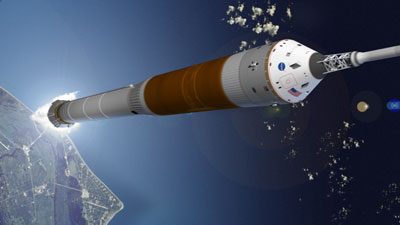How to cut budgets and influence policyby Michael Huang
|
| We are supposed to believe that a $670 million cut—a year-long time-out for a three-month review—is actually unprejudiced support of human spaceflight. |
In case the Augustine committee defies expectations, there are restrictions written in its charter. The committee has to come up with options “fitting within the current budget profile for NASA exploration activities”, a budget that has been preemptively cut in the out-years by $3 billion compared to previous plans. NASA is facing drastic cuts and limits when many other science and technology budgets are doubling, ironically driven by Augustine’s previous “Gathering Storm” report.
The disguised policy signals from the White House have reached the House of Representatives. A cut of $670 million from the Exploration account was explained by Congressman Alan Mollohan, chairman of the subcommittee responsible for he appropriations bill that funds NASA, as follows: “Reductions from the budget request should not be viewed as a diminution of my support or that of the Subcommittee in NASA’s human space flight activities. Rather, the deferral is taken without prejudice; it is a pause, a time-out, to allow the President to establish his vision for human space exploration and to commit to realistic future funding levels to realize this vision.” We are supposed to believe that a $670 million cut—a year-long time-out for a three-month review—is actually unprejudiced support of human spaceflight. Using this logic, if a budget cut equals support, then a budget increase must mean opposition. NASA could stop worrying about cuts if only Mollohan could be persuaded to oppose human spaceflight.
This is all happening against the backdrop of President Obama’s election promises. The Obama campaign made the unambiguous statement that “Barack Obama will support renewed human exploration beyond low earth orbit. He endorses the goal of sending human missions to the Moon by 2020, as a precursor in an orderly progression to missions to more distant destinations, including Mars.” The 2020 date, though, is notably missing from the charter of the Augustine committee. Science advisor John Holdren, the White House official responsible for the Augustine committee, is in no hurry to reinstate it, based on comments he made on NPR’s “Science Friday” program last month:
John Holdren: …We certainly did not announce a change in vision. We announced a fresh look at the options for achieving our vision.
NPR host Ira Flatow: President Bush did set a date for going back to the moon. Are you saying that date now is on the table, or it’s up in the air, or we don’t know?
John Holdren: Well indeed, President Bush announced a grand vision with specific dates but he never did provide the budget that would be consistent with getting there, and so obviously one of the things we have to look at, under realistic budget constraints, is whether that date is attainable or not.
The 2020 goal was established by President Bush and endorsed by a Republican Congress, then a Democratic Congress, and then presidential candidate Obama in 2008. In the NPR interview, Holdren says the Augustine committee is not about changing policy, but then promptly puts the 2020 policy in doubt. Holdren also assumes that the solution to chronic underfunding is to cut the program. The other solution to underfunding is adequate funding, but this option appears to be summarily ruled out for NASA.
| The Augustine committee will probably ask the usual question of why put humans in space. A more interesting question is to ask the other side—why should we eliminate humans in space? |
The Augustine committee can play its part in this political theatre. If the committee criticizes the 2020 date, and other campaign promises, this achieves two useful objectives. The committee can publicly criticize Obama, demonstrating its political independence. Secondly, it gives the Obama administration a convenient way out of its promises. The administration can shift responsibility and blame to the unelected, unaccountable committee.
It seems that at least some in the Obama administration want to cut human spaceflight. But cutting it excessively risks losing votes and elections. So the administration is aiming for that sweet spot where it maximizes damage to the “bad guys” while minimizing damage to itself. The current attempt would appear to restrict and contain human spaceflight so that it never returns to the heights and the popularity of the Apollo program. A mediocre and unpopular program would be easier to kill off.
The Augustine committee will probably ask the usual question of why put humans in space. A more interesting question is to ask the other side—why should we eliminate humans in space? What are the motivations and justifications for dismantling the engineering that enables human life beyond Earth? The burden of proof should be on the other side for a change.
